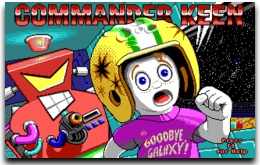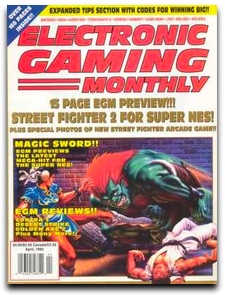id Software Interested in Nintendo’s Wiiid Software Interested in Nintendo’s Wii
Nintendo is seeing some great successes with their console — duh. What is the best way to provide evidence that Nintendo has a hit with their new little white console? Perhaps the bright blue eyes of id Software? Originally, it was said that id Software wasn’t really interested in developing games for the Wii, perhaps because it goes against all that id Software has developed their company towards since 1991?
 id Software has always leaned toward bleeding edge content, pushing hardware to its limits and utilizing technology that has just hit the market. Nobody is surprised when they’re forced to upgrade their computers to play the latest id Software creation to its fullest extent. This is the price for being top dog in graphic engines, but now they’re changing their tune a bit.
id Software has always leaned toward bleeding edge content, pushing hardware to its limits and utilizing technology that has just hit the market. Nobody is surprised when they’re forced to upgrade their computers to play the latest id Software creation to its fullest extent. This is the price for being top dog in graphic engines, but now they’re changing their tune a bit.
Okay, it has to be said, is id Software contemplating a Wii game simply because of Nintendo’s success with the console? The core id Software audience isn’t grandma and grampa or the 10-year old kid next door. But, money talks. We’re not saying id Software is hurting for money although we’re not sure what keeps them floating given their last major title was yet another Quake game launched in 2005 with 2004’s DOOM 3 looking like an old man by now. Everyone is waiting on Rage which was announced in 2007 and still hasn’t been given a release date.
Perhaps id Software could use a little Wii to get their name back in the press, get bloggers talking and net them some fresh cash from a large pool of Wii owners looking for their next tennis game. Okay, nobody is going to believe they’d work on a silly Wii Sports clone but they’ve not announced, yet, what this “exclusive Wii” game will be. Carmack did say the Wii is “out of sync with the developments that are currently going on at id,” which suggests they’re going to be working on a new property or perhaps bring back an old property… Wolfenstein 3D, Commander Keen or maybe some Heretic action?
We’ll assume this upcoming id Software title won’t be 100% kid friendly even targeting a Wii platform. Are they going to develop a title for the Wii simply because they know it will be launched on a console with the largest install base in the world? Or, perhaps its a new found passion that Carmack has developed from sharing the Wii experience with his four-year old boy?
(Thanks, 1up)

 It makes sense for Sony to try to push themselves away from being classified with the Wii console because it makes them look bad. We’re all equal gamers here, there is no need to break into more sub-categories when only three consoles vying for top spot. Many folks (including us) criticize the slow adoption rate of Wii games, yet they steal top software sales spots as well.
It makes sense for Sony to try to push themselves away from being classified with the Wii console because it makes them look bad. We’re all equal gamers here, there is no need to break into more sub-categories when only three consoles vying for top spot. Many folks (including us) criticize the slow adoption rate of Wii games, yet they steal top software sales spots as well. Bad economic times mingled with company acquisition spells disaster for many game titles but the story ends well, we hope, for Ghostbusters. The game was slated for a Holloween release, last year, but was given the boot by
Bad economic times mingled with company acquisition spells disaster for many game titles but the story ends well, we hope, for Ghostbusters. The game was slated for a Holloween release, last year, but was given the boot by  As not to be shown up by other conferences, E3 is bringing back the booth babes, the glitz, the glamor and the publishers and developers. All but NCSoft is reported to be making it to E3 this year and they’re opening up registration again, without having an invite only exclusive club.
As not to be shown up by other conferences, E3 is bringing back the booth babes, the glitz, the glamor and the publishers and developers. All but NCSoft is reported to be making it to E3 this year and they’re opening up registration again, without having an invite only exclusive club. Now even Bethesda is saying
Now even Bethesda is saying  The famous Michael Pachter, industry analyst has been drawing some strong connections between Xbox 360 gamers and the Netflix subscriber base since 360 launched their Netflix addition. Our family has seen the same thing, we signed up for Netflix a few days after it arrived on the Xbox 360 firmware launch.
The famous Michael Pachter, industry analyst has been drawing some strong connections between Xbox 360 gamers and the Netflix subscriber base since 360 launched their Netflix addition. Our family has seen the same thing, we signed up for Netflix a few days after it arrived on the Xbox 360 firmware launch. This leaves Sony with some hard decisions. Restructuring can mean drastic changes that effect all their product lines. The PlayStation 3 isn’t currently a shining example of high profit margins. The console needs time to reduce its overall cost, chip sizes and bring profitability. Is it in danger?
This leaves Sony with some hard decisions. Restructuring can mean drastic changes that effect all their product lines. The PlayStation 3 isn’t currently a shining example of high profit margins. The console needs time to reduce its overall cost, chip sizes and bring profitability. Is it in danger? This is not the fault of GameStop and their 48% profit margins because they’re only getting 7% to 20% profit margins (
This is not the fault of GameStop and their 48% profit margins because they’re only getting 7% to 20% profit margins ( Granted, there were other glossy magazines prized by young boys too, but we were old enough to purchase Electronic Gaming Monthly, now known as EGM by the hip and cool. Although EGM was founded in 1989, many adults between the age of 29 and 35 probably spent their youth flipping through the pages reading the reviews and editorials.
Granted, there were other glossy magazines prized by young boys too, but we were old enough to purchase Electronic Gaming Monthly, now known as EGM by the hip and cool. Although EGM was founded in 1989, many adults between the age of 29 and 35 probably spent their youth flipping through the pages reading the reviews and editorials. Only 13.4% of gamers are playing the Wii even though it’s the hottest selling console on the market, showing the fury of the casual gamer it seems. It’s trendy to own a Wii but it’s not trendy to play it; it would be interesting to see how much of the 13.4% is Wii Sports.
Only 13.4% of gamers are playing the Wii even though it’s the hottest selling console on the market, showing the fury of the casual gamer it seems. It’s trendy to own a Wii but it’s not trendy to play it; it would be interesting to see how much of the 13.4% is Wii Sports.